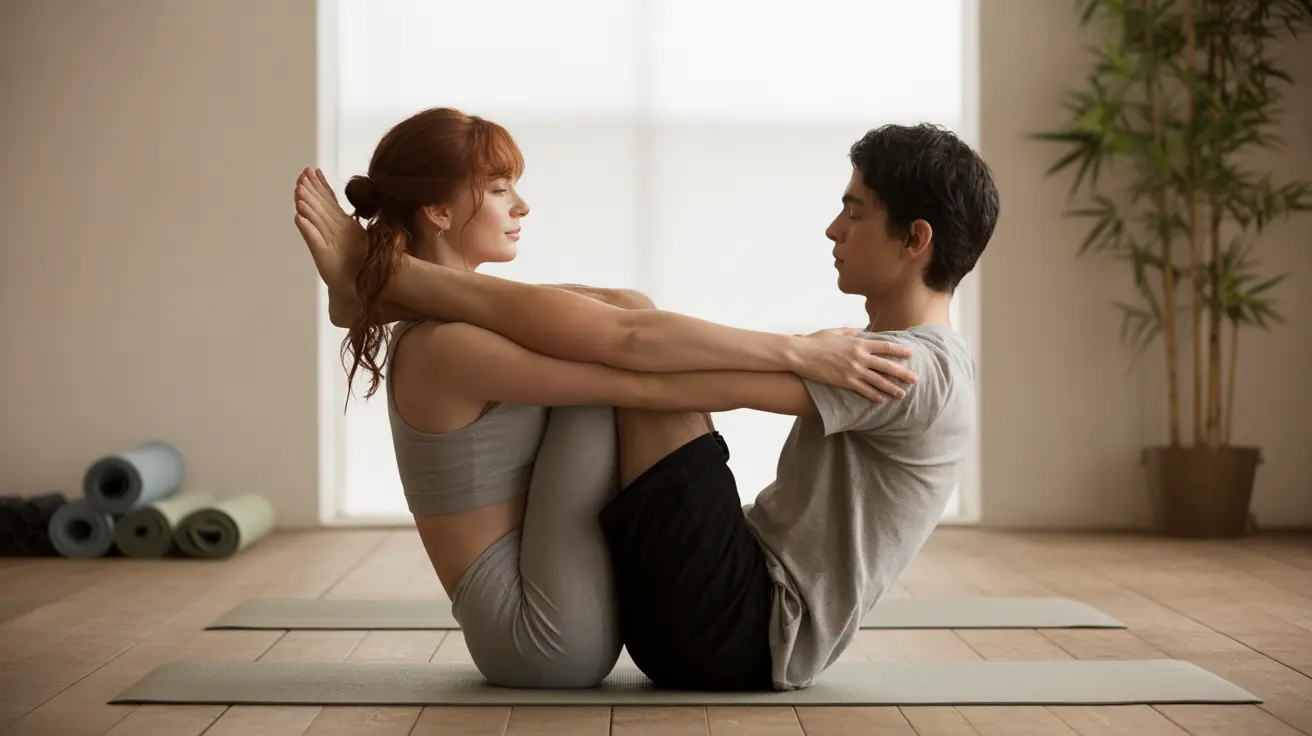Partner yoga offers a unique and enriching way to deepen your practice while building trust and connection with another person. Whether you're practicing with a romantic partner, friend, or family member, this guide will help you safely explore beginner-friendly poses designed for two people.
This collaborative form of yoga not only enhances physical flexibility and strength but also creates opportunities for meaningful bonding and improved communication. Let's explore how you can get started with partner yoga safely and effectively.
Understanding the Benefits of Partner Yoga
Partner yoga combines traditional yoga principles with the added dimension of working with another person. This practice offers unique advantages that go beyond solo yoga practice:
- Enhanced balance and stability
- Deeper stretches through gentle assistance
- Improved communication skills
- Strengthened trust and connection
- Increased body awareness
- Better coordination and focus
Essential Partner Yoga Poses for Beginners
Partner Breathing Exercise
Before moving into physical poses, start with a simple breathing exercise to establish synchronicity:
- Sit back-to-back with your partner
- Feel each other's breath rhythm
- Gradually synchronize your breathing
- Practice for 3-5 minutes
Double Tree Pose
This standing pose helps develop balance and trust:
- Stand side by side
- Hold hands or connect at the shoulders
- Lift opposite legs and press soles against inner thighs
- Hold for 30-60 seconds
- Switch sides and repeat
Partner Forward Fold
This gentle stretch helps release tension in the back and hamstrings:
- Stand back-to-back, about 2 feet apart
- Both partners fold forward
- Grasp each other's hands between legs
- Gently pull to deepen the stretch
- Hold for 30-45 seconds
Building Trust Through Partner Yoga
Success in partner yoga relies heavily on trust and clear communication. Establish these foundational elements:
- Set clear boundaries before beginning
- Communicate continuously during poses
- Listen to your partner's feedback
- Move slowly and mindfully
- Respect each other's limitations
Safety Guidelines for Partner Yoga
Prioritize safety to ensure an enjoyable experience:
- Warm up individually before partner work
- Start with simple poses and progress gradually
- Maintain proper alignment
- Never force or bounce into stretches
- Use verbal cues to coordinate movements
- Stop if either partner experiences discomfort
Frequently Asked Questions
What are some beginner-friendly partner yoga poses for couples or friends to enhance flexibility and communication?
The most accessible partner yoga poses include back-to-back breathing exercises, double tree pose, and partner forward folds. These poses help build trust while gently increasing flexibility and requiring clear communication between partners.
How can practicing partner yoga improve trust and intimacy in relationships?
Partner yoga cultivates trust through physical support, synchronized breathing, and ongoing communication. The practice requires partners to be present, attentive, and responsive to each other's needs, naturally fostering deeper intimacy and understanding.
What are the benefits of incorporating partner yoga into a regular exercise routine for overall well-being?
Regular partner yoga practice enhances physical strength, flexibility, and balance while promoting mental well-being through shared experience and mutual support. It also adds variety to existing exercise routines and strengthens relationships.
Can partner yoga help reduce stress and improve mood, and if so, how?
Yes, partner yoga can significantly reduce stress and improve mood through the release of endorphins, synchronized breathing exercises, and the positive effects of human connection. The practice combines the stress-reducing benefits of traditional yoga with the mood-boosting effects of social interaction.
What are some essential safety tips to keep in mind when starting partner yoga with a beginner partner?
Essential safety tips include warming up properly, starting with basic poses, maintaining clear communication, respecting physical limitations, and avoiding forced movements. Always practice on a non-slip surface and ensure both partners are comfortable with the level of physical contact involved.




